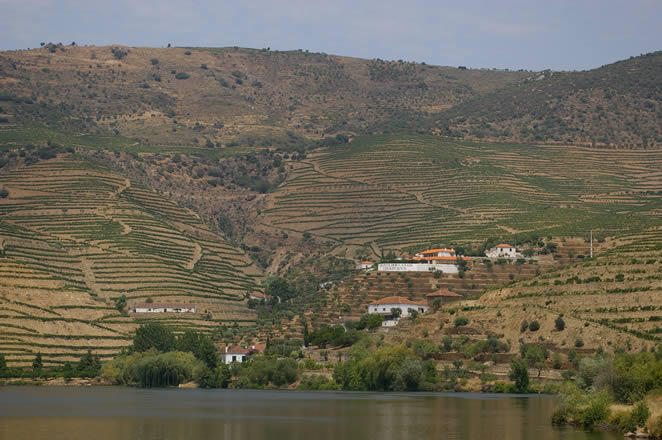|
The
New Douro 2004

I reckon 2004 will stand out as a defining year for the
Douro table wines. We need to remember that the history of serious
table wines in the Douro is a remarkably short one. Itís only in
the last decade that there have been more than a handful of
producers making top quality non-fortified wines, and the history of
most of the wines tasted here is much shorter than that. With each
new vintage there are newcomers doing good work.
2002 was a difficult year in most of the Douro so time
was lost; 2003 was better, but still a little tricky with extreme
heatóeven by Douro standards where very hot summers are the norm.
So it is only with the 2004 vintage that we have a critical mass of
impressive wines such that I feel (at least) we can say that this
region is firmly planted as one of the worldís greats when it
comes to table wines. However, itís possible that Iím letting my
enthusiasm get the better of me, here, and this judgement is
premature.
Is
there an emerging Douro style? Itís still too soon to say. I would
disagree with those who think that the best Port vineyards are also
going to be the best for table wines. I know style is to an extent a
personal choice, and itís presumptuous of me to think I can tell
wine producers what sorts of styles to aim at, but for what itís
worth, hereís my opinion.
I
think the Douro will have missed an opportunity if producers aim to
make big, very ripe, alcoholic Ďinternationalí-style red wines,
bolstered by new oak, and which have at best a five year drinking
window. I think they are better off aiming for a style that
champions elegance and ageworthiness over extraction and sweet, dead
fruit (from very late picking). Yes, the Douro is a warm region and
the wines from here will be powerful. Indeed,
thereís nothing wrong with power, but as some of the best Douro
reds have shown, power can be coupled with restraint and even
elegance.
Some
winemaking styles obliterate terroir; the Douro should aim at
letting the varied terroirs express themselves (whatever this
meansóI guess what Iím looking for is a variety of different
styles of wines reflecting local influences). Another thought: I
think blending will be important, just as it has been with the Port
trade. Single vineyards may not be the way to go. If you have
several vineyards, with different aspects and altitudes, to choose
from, the possibility of making use of terroir to assist blending a
more complete wine becomes a possibility.
The
potential is there for the Douro to emerge as one of the great,
classic table wine regions, and this neednít happen at the expense
of Port. But to achieve this it has to do more than simply offer
another batch of big, ripe, new world-style reds that could have
come from just about anywhere. The Douro has a good story; now it
needs to make use of the limited window of opportunity that is now
openóyou only get one chance to tell your story to the world, so
tell it well by making distinctive, serious, thought-provoking
wines.
Before
I finish opining, something has to be said about Robert Parkerís
recent appointment of Mark Squires to cover Portugal for the Wine
Advocate. This is both good and bad news for Portuguese wine
producers, though exactly how much of each remains to be seen. Mark
a lawyer by training, and an internet wine geek who set up a
bulletin board which became assimilated into Parkerís website,
erobertparker.com some years back. Itís now the most widely read
internet wine discussion board by some distance.
The
good news for Portugal is that it will now get coverage in the Wine
Advocate, thus increasing visibility in the all important US
market, as well as in the far east. The bad news is that Robert
Parker will not be rating any Portuguese wines. Parker is the king
maker: good reviews from him could validate Portuguese wines in the
eyes of a so far sceptical and largely ignorant (of Portuguese
wines) American public.
The
fact that Parker has given the job to his bulletin board
moderatoróa first gig for someone with no track record in wine
journalismócould be construed by the Portuguese winemakers as a
bit of a slight. However, the proof will be in the pudding, and
everyone deserves a fair chance. So Mark Squires has a great
opportunity to establish his reputation as a reliable critic whoís
worth listening to; this will also be a great test for him. Will he
opt for the obvious, rather spoofulated wines? Will he recognize the
really great wines? Will his verdicts be as consistent and reliable
as those of his boss? Will his own preferences go on to shape the
style of Portuguese wines to come? Itís both an exciting and
rather worrying time for Portuguese producers.
I tasted most of these wines twice: once at the Tate
Modern, London in May 2006, and then again at the Vintage House
Hotel in the Douro in July 2006. Notes are a composite of the two
experiences where the same wine has been tasted twice. Fortunately,
scores and impressions didnít differ too much, which is always
reassuring. Additional impressions of wines tasted subsequently will
also be included for the sake of completeness.
Part
1
Part
2
Part
3
Part
4
Part
5
Wines tasted 01, 07, 10, 11/06
Find
these wines with wine-searcher.com
Back
to top
|

